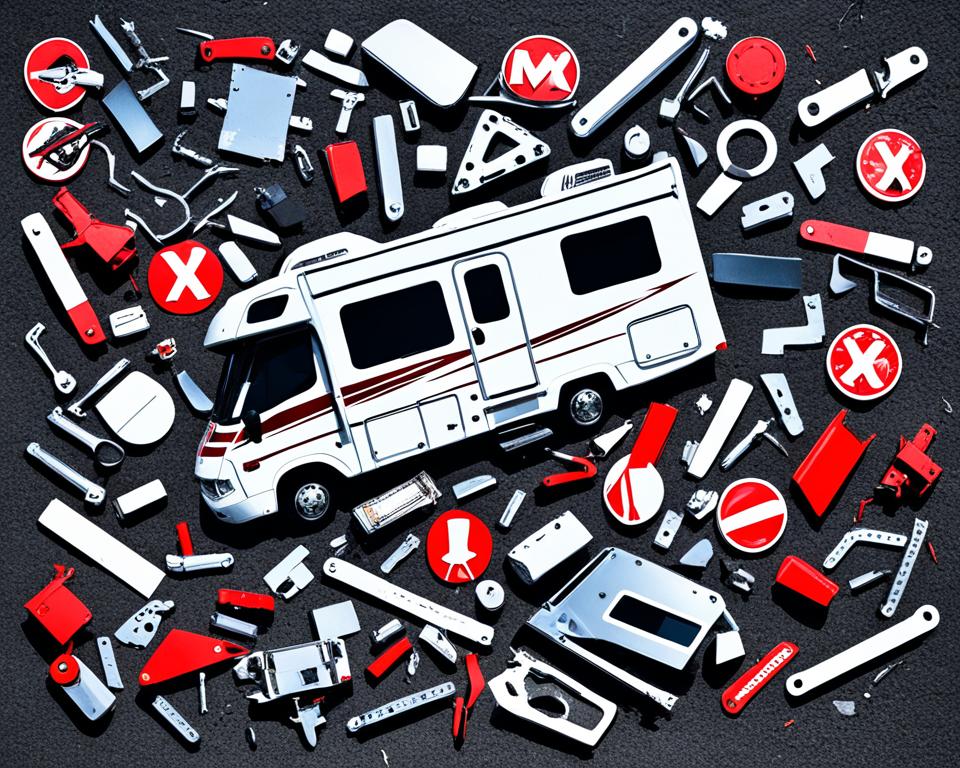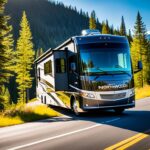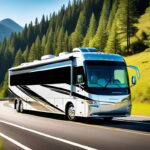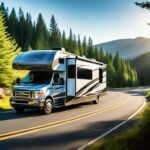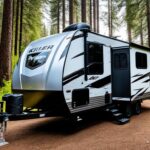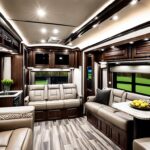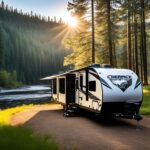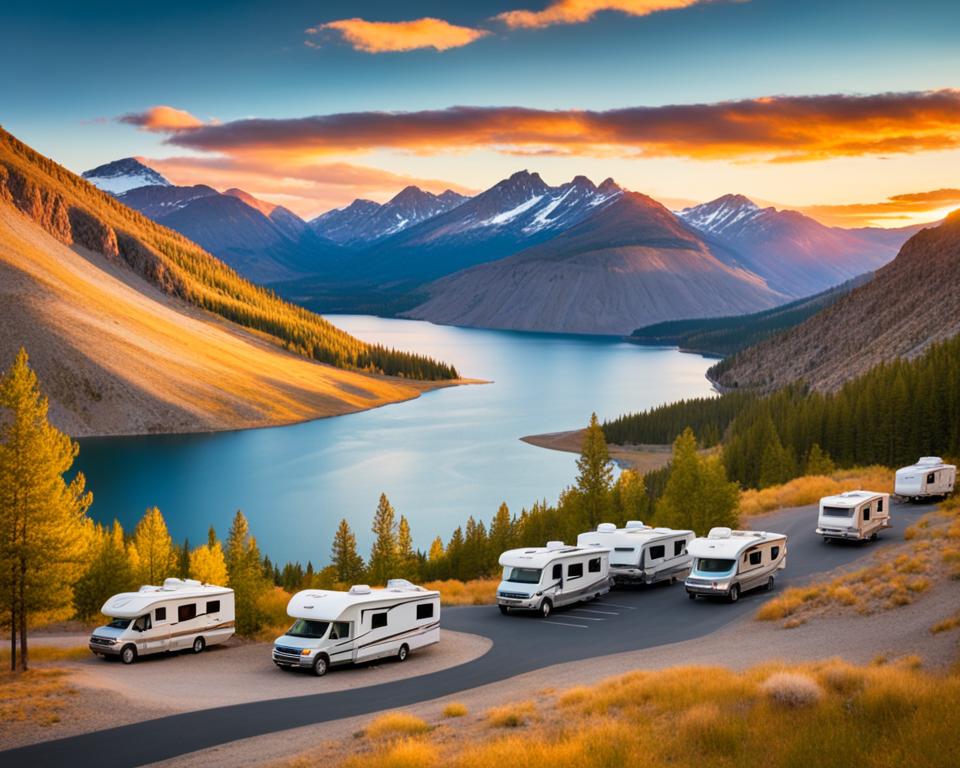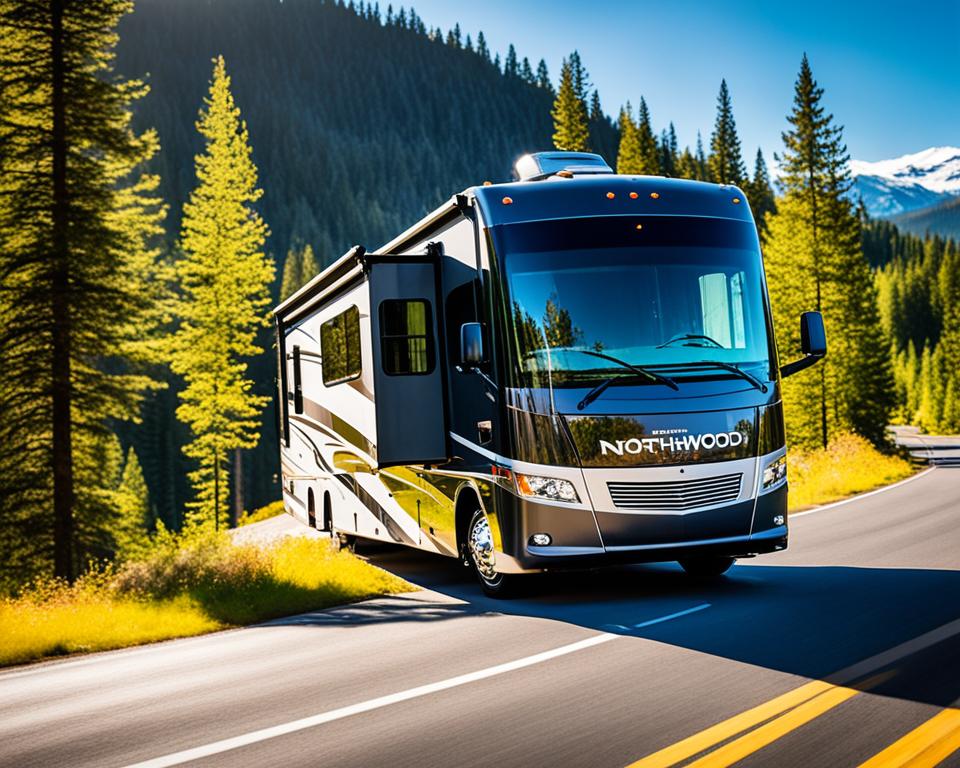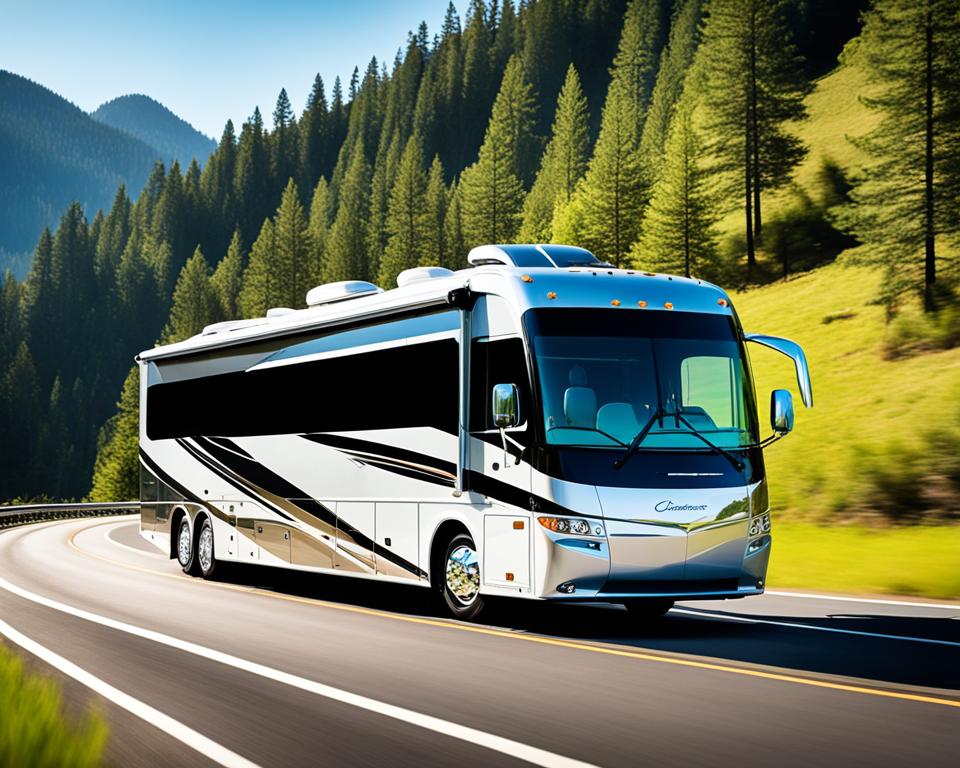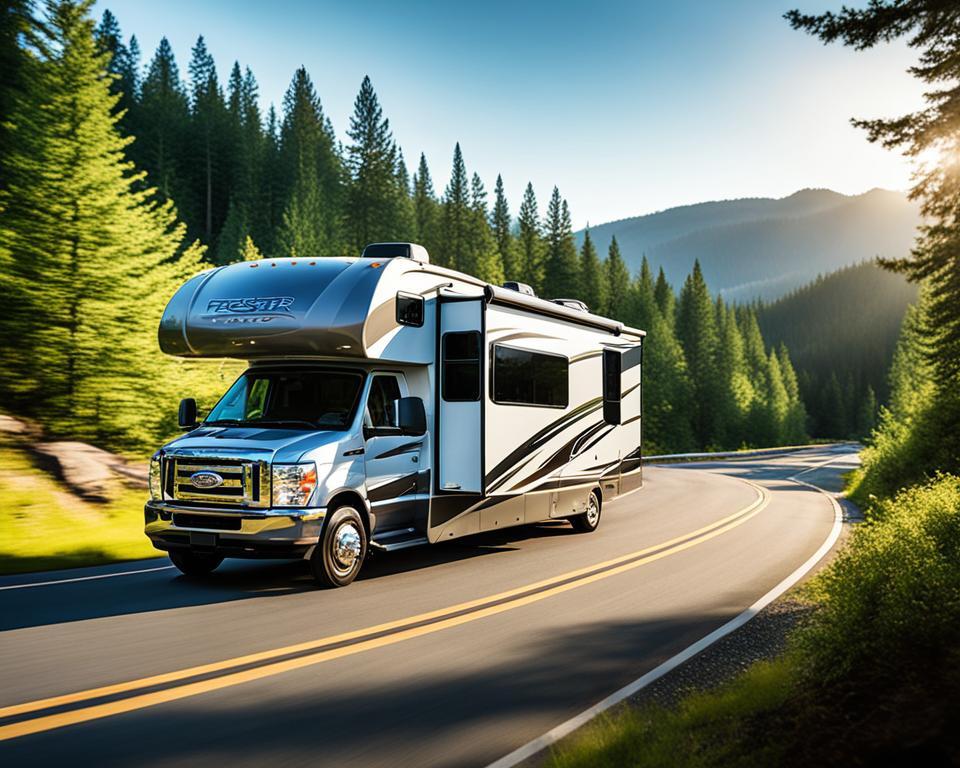When shopping for a motorhome, it’s important to be aware of the brands that have a reputation for being unreliable or of low quality. Avoiding these motorhome brands can help you make a smart choice and ensure that you’re investing in a reliable adventure on the road.
Key Takeaways:
- Research and avoid motorhome brands known for unreliability.
- Invest in a motorhome with a reputation for quality and durability.
- Read reviews and gather feedback from other motorhome owners.
- Consider factors such as warranty coverage and customer support.
- Shop smart to make an informed decision and enjoy your motorhome adventures.
The Shady Truth About Buying an RV
The process of buying an RV can be an exciting adventure, but it can also come with its fair share of challenges and frustrations. Unfortunately, many RV shoppers have encountered shady sales tactics and dishonest RV salesmen along the way. It’s essential to be aware of these issues before diving into the RV buying process to avoid unnecessary frustration and disappointment.
One common frustration when shopping for an RV is encountering shady sales tactics. Some RV salesmen may employ tactics such as high-pressure sales pitches, false sense of urgency, or even misleading information to convince you to make a quick purchase. They may try to push you towards a more expensive model or convince you that a particular RV is in high demand, leading to impulse purchases that may not be right for your needs or budget.
Another issue that RV shoppers often face is dealing with dishonest salesmen who may not provide accurate information about the RV’s condition, features, or history. They may downplay any potential issues or hide crucial information that could affect your decision-making process. This misinformation can lead to disappointment and frustration when you discover the truth about the RV after making a purchase.
“We were looking for our dream RV, but the salesman kept pushing us towards a more expensive model that we couldn’t afford. He made it seem like it was our only option, but we knew deep down that it wasn’t right for us. It was a frustrating experience, and we had to walk away.”
Don’t Fall for the Shady Tactics
To avoid falling victim to shady RV sales tactics and dishonest salesmen, it’s crucial to do your research and go into the buying process with a clear understanding of what you want and need in an RV. Here are a few tips to help you navigate the RV shopping journey:
- Set a budget and stick to it: Determine how much you’re willing to spend on an RV and be firm in your budget. Don’t let salesmen persuade you to overspend by making you feel like you’re missing out on a once-in-a-lifetime opportunity.
- Do thorough research: Research different RV models, brands, and features before visiting a dealership. Having a good understanding of what you’re looking for will make it easier to recognize any false claims or misleading information.
- Ask for documentation: If a salesman makes a claim about an RV’s condition or history, ask for supporting documentation or proof. Don’t solely rely on verbal assurances.
- Take your time: Don’t rush into a decision. Take your time to explore different options, compare prices, and ask questions. A reputable dealership will respect your decision-making process and allow you the time you need.
- Get a second opinion: Consider getting a professional inspection or consulting with an experienced RV enthusiast when making a final decision. They can provide you with additional insights and help validate the information provided by the salesperson.
By being aware of these shady sales tactics, arming yourself with knowledge, and staying vigilant throughout the RV shopping process, you can avoid frustration and disappointment and find the perfect RV that meets your needs and budget. Happy RV shopping!
| Common Shady RV Sales Tactics | Tips to Protect Yourself |
|---|---|
| High-pressure sales pitches | Set a budget and stick to it |
| False sense of urgency | Take your time and don’t rush into a decision |
| Misleading information | Do thorough research and ask for documentation |
| Pushing for a more expensive model | Know what you want and stick to your preferences |
| Downplaying potential issues or hiding information | Get a second opinion and consider professional inspections |
Price Expectations when Purchasing a New RV
When it comes to buying a new RV, one of the most important considerations for buyers is the purchase price. Naturally, we all want to get the best deal possible and save some money along the way. It’s no different for RV shoppers! In this section, we’ll dive into the factors that can influence the price of a new RV and provide insights on how to negotiate and make the most of your budget.
Understanding RV Purchase Price
Typically, when purchasing a new RV, buyers expect to pay less than the manufacturer’s suggested retail price (MSRP). The MSRP serves as a benchmark for pricing, but it’s important to note that the final purchase price can vary based on different factors and negotiations.
Factors Affecting RV Pricing
Several factors can influence the price of a new RV. One of the most significant factors is the presence of factory incentives and discounts. RV manufacturers often offer special promotions and factory incentives to incentivize buyers. These incentives can include cashback offers, bonus features, or even discounted financing options. By staying informed about the available incentives, you can maximize your savings and potentially negotiate an even better deal with the dealership.
Negotiating for the Best Price
When it comes to negotiating the price of an RV, research and preparation are key. Start by researching the average purchase price for the specific make and model you’re interested in. Utilize online resources, such as RV pricing guides and forums, to get an idea of how much others have paid for similar RVs.
Armed with this information, approach dealerships and begin the negotiation process. Be confident and ready to discuss your research, factory incentives, and any other relevant discounts or offers you’ve come across. Remember, negotiation is an essential part of the RV buying process, and dealerships expect buyers to negotiate.
Best Places to Buy an RV
When it comes to finding the best deals on new RVs, there are a few key places that stand out. One of the top options is to visit a major RV show. These shows bring together multiple dealerships and manufacturers all under one roof, creating a competitive environment that can work in your favor.
At major RV shows, you’ll have the opportunity to explore a wide range of RV models and speak directly with knowledgeable sales representatives. This allows you to compare prices, features, and options from various dealerships, giving you a better chance of finding the perfect RV for your needs.
The first day of the show is often considered the prime time to score a great deal. Dealerships may offer exclusive discounts or promotions to attract buyers and create buzz. However, if you’re willing to be patient, you can also find deals on the last day of the show, especially in the last few hours when dealerships are eager to make sales.
To maximize your chances of finding the best RV deals, it’s crucial to plan ahead and research the upcoming major RV shows in your area. Dedicate enough time to attend the show, explore different models, and negotiate prices with dealerships.
“Major RV shows bring together multiple dealerships and manufacturers, creating a competitive environment that can work in your favor.”
| Benefits of Buying an RV at Major RV Shows | Considerations |
|---|---|
| You can compare prices, features, and options from multiple dealerships. | Research and plan ahead to make the most of your visit. |
| Dealerships may offer exclusive discounts or promotions during the show. | Be patient and consider deals available on the last day. |
| Directly speak with knowledgeable sales representatives. | Take your time to explore different RV models. |
Remember, buying an RV is a significant investment, and finding the best deal requires careful consideration. Attending major RV shows can provide you with the opportunity to explore a wide selection of RVs, take advantage of exclusive offers, and ultimately find the RV that meets your needs and budget.
“Attending a major RV show can save you time and effort by bringing together multiple dealerships and manufacturers, allowing you to compare prices, features, and options all in one place.”
Best Time of Year to Buy an RV
When it comes to buying an RV, timing can make a significant difference in your savings. Understanding the dynamics of the RV market can help you secure a great deal. The best time of year to buy an RV is when dealerships are clearing out old models to make space for the new ones. This creates a unique opportunity for buyers to take advantage of RV model clearance sales and score big discounts.
As new RV year models are released, dealerships face the challenge of selling off their existing inventory quickly. To entice buyers, they often offer substantial discounts on older models. This allows buyers to get more RV for their money, as they can enjoy the features and amenities of higher-end models at a discounted price.
However, it’s important to keep in mind that the supply of older models during this clearance period may be limited. This means that buyers may not have as many options when it comes to floor plans or specific features. It’s essential to research and prioritize your must-haves to ensure you find the right RV for your needs.
Benefits of Buying During RV Model Clearance:
- Opportunity to get big discounts on older models
- Potential to enjoy higher-end features and amenities at a lower price
- Availability of popular models at reduced rates
Considerations when Buying During RV Model Clearance:
- Limited supply of older models
- Possibility of fewer options in terms of floor plans and specific features
- Research and prioritization of must-haves is crucial
To illustrate the potential savings during this time, let’s take a look at a comparison table showcasing the average discounts during RV model clearance sales:
| RV Brand | Model | MSRP | Clearance Price | Discount |
|---|---|---|---|---|
| Brand A | Model X | $100,000 | $75,000 | 25% |
| Brand B | Model Y | $90,000 | $65,000 | 27.8% |
| Brand C | Model Z | $110,000 | $80,000 | 27.3% |
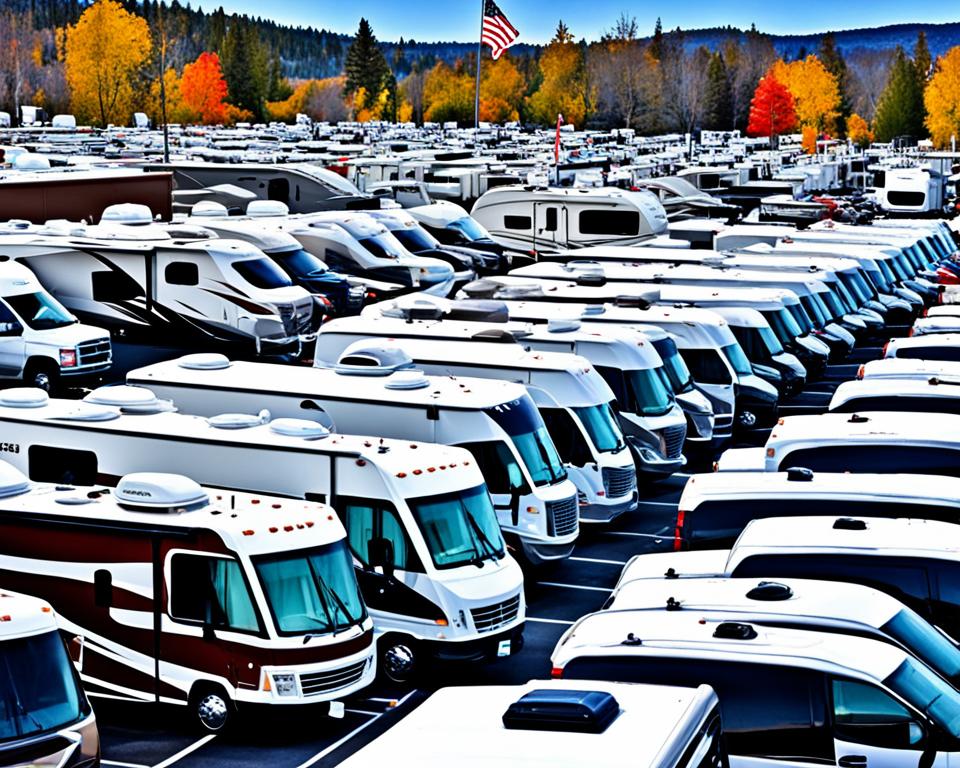
The table above demonstrates the substantial discounts available during RV model clearance sales. Buyers can save up to 27.8% off the manufacturer’s suggested retail price (MSRP) during this time. It’s important to note that these discounts may vary depending on the brand, model, and dealership. Doing thorough research and comparing prices across multiple dealerships can help you find the best deal.
Therefore, if you’re looking to purchase an RV and want to maximize your savings, consider timing your purchase during the RV model clearance period. While the supply of older models may be limited, the opportunity to score a great deal on a high-quality RV is worth exploring.
Buying Direct from the Manufacturer
When looking to purchase an RV, buyers have the option to buy direct from the manufacturer, bypassing the dealership markup. This can be a great way to save on costs and get a better deal. However, it’s important to approach these direct sales with caution and do thorough research before making a purchase. While buying RVs direct can have its advantages, it’s still essential to navigate the sales process wisely and ensure that you’re getting the best value for your money.
Just as when dealing with dealerships, it’s important for buyers to be aware of potential sales tactics and false discounts when buying RVs direct. Sometimes, manufacturers may try to entice buyers with show specials and limited-time offers. It’s essential to do your due diligence and compare prices, features, and warranties to make an informed decision.
Additionally, buying direct from the manufacturer can sometimes mean missing out on the personalized service and expertise that dealerships provide. Dealerships often have dedicated service centers, knowledgeable staff, and the ability to handle warranty repairs and maintenance. Buyers should consider their preferences and needs and weigh the pros and cons of buying RVs direct versus purchasing from a dealership.
Benefits of Buying Direct:
- Lower Costs: Buying direct from the manufacturer can help you avoid dealership markup, potentially saving you thousands of dollars.
- Customization Options: Some manufacturers offer customization options, allowing you to tailor the RV to your specific needs and preferences.
- Direct Communication: Buying direct gives you a direct line of communication with the manufacturer, making it easier to address any concerns or questions you may have.
- Factory Direct Warranty: Many manufacturers offer factory direct warranties, providing peace of mind and coverage for potential repairs and maintenance.
While buying RVs direct can be a favorable option for many buyers, it’s crucial to do thorough research and compare prices, features, and warranties before making a final decision. Take the time to read customer reviews, ask for recommendations, and reach out to the manufacturer with any inquiries or concerns you may have.
Remember, whether buying from a dealership or direct from the manufacturer, the most important thing is to find an RV that meets your needs, offers the desired features, and fits within your budget. Taking the time to make an informed decision will ensure that you embark on your RV adventures with confidence and excitement.
Sales Tactics to Watch Out For
When it comes to buying an RV, it’s important to stay vigilant and watch out for some of the sales tactics that can be used to sway your decision. RV salesmen are known for their convincing sales pitches and misleading sales recommendations. Being aware of these tricks can help you make a well-informed decision and avoid any regrets down the road.
One common sales tactic is for the salesperson to show you a range of RVs, including ones that may not be as nice or larger than what you initially wanted. The idea behind this is to make your original choice seem like the best option, even if it may not be the most suitable for your needs. Remember to stick to your own preferences and not be swayed solely by a salesperson’s recommendations.
Stick to Your Budget and Preferences
When shopping for an RV, it’s essential to set a budget and stick to it. Salespeople may try to convince you that a higher-priced RV is worth the investment, but don’t be easily swayed. Stay firm and prioritize your own financial goals and needs. Remember, it’s your money and your future adventures on the line.
Quote: “It’s important to trust your own instincts and do thorough research before making a purchase. Don’t let a salesperson pressure you into a decision that you may regret later.” – RV enthusiast, Laura Johnson
Additionally, make sure to consider your own preferences and what features are important to you in an RV. Don’t be persuaded by a salesperson who tries to push you towards a model that may not meet your specific needs. Take the time to evaluate different options and choose the one that aligns with your lifestyle and travel plans.
| Common RV Sales Tactics | How to Counter Them |
|---|---|
| Showing RVs that are not as nice or larger than what you originally wanted | Stay focused on your preferences and stick to your budget |
| Promising exclusive discounts or limited-time offers | Do your research and compare prices from multiple dealerships |
| Using high-pressure sales tactics to rush your decision | Take your time, ask questions, and don’t be afraid to walk away if needed |
| Offering extended warranties with hidden costs | Read the fine print, understand the terms, and consider if it’s worth the investment |
Remember, buying an RV is a significant investment, and it’s essential to make a decision that you feel confident and comfortable with. By staying informed and being aware of common sales tactics, you can navigate the buying process more effectively and find the perfect RV for your adventures.
Understanding Quality Differences in RV Models
When it comes to purchasing an RV, not all models are created equal. There can be significant variations in quality even within the same brand. It’s essential for buyers to understand these differences to make an informed decision that aligns with their expectations and requirements.
For instance, budget RVs are often designed to compete on price, resulting in potential compromises in materials and features. Entry-level models may utilize lower-quality materials compared to their higher-end counterparts. They may also offer fewer factory options to keep costs down.
By understanding these quality variations, buyers can navigate the market more effectively and choose an RV that meets their specific needs. Whether you’re looking for a budget-friendly option or a more luxurious experience, being aware of the differences in RV models will guide you towards the right choice.
Comparison of Budget RVs vs. Higher-End RVs
| Aspect | Budget RVs | Higher-End RVs |
|---|---|---|
| Materials | Lower-quality materials | Higher-quality materials |
| Features | Limited factory options | Extensive range of features |
| Construction | Simpler construction techniques | Advanced construction techniques |
| Amenities | Basic amenities | Luxurious amenities |
| Price Range | Affordable | Higher price point |
As seen in the table above, budget RVs generally feature lower-quality materials, limited factory options, and more straightforward construction techniques. On the other hand, higher-end RVs offer higher-quality materials, an extensive range of features, advanced construction techniques, luxurious amenities, and a higher price point.
Before making a decision, it’s crucial to assess your requirements, budget, and long-term goals. Understanding the trade-offs between budget RVs and higher-end models will help you choose an RV that strikes the right balance between affordability and the features you desire for a comfortable and enjoyable travel experience.
“Quality is never an accident; it is always the result of intelligent effort.” – John Ruskin
Service and Maintenance Considerations
When purchasing an RV, it’s essential to take service and maintenance options into consideration. While some dealerships may try to convince buyers that they won’t provide service if the RV is not purchased from them, there are usually alternative service centers available. It’s important to be aware of the options and not let scare tactics influence your decision.
Dealership Service vs. Alternative Service Centers
Many RV dealerships offer service and maintenance for the vehicles they sell. However, it’s important to note that this is not the only option available. Alternative service centers that specialize in RV repairs and maintenance can often provide the same level of care, even if the RV was not purchased from the dealership.
“Don’t let scare tactics influence your decision. There are alternative service centers available for your RV maintenance needs, even if you didn’t purchase your RV from the dealership.”
Before purchasing an RV, it’s wise to research the reputation and reviews of both the dealership’s service department and alternative service centers. Look for centers that have experience working on your specific RV brand and model to ensure they have the necessary expertise and knowledge. Reading reviews and testimonials from other RV owners can give you valuable insights into the quality of service provided.
Warranty Repairs
Another important consideration is warranty repairs. RVs typically come with manufacturer warranties that cover certain repairs and replacements within a specified period. Understanding the details of the warranty and its coverage is crucial to avoid any unexpected costs.
If your RV needs warranty repairs, the dealership where you purchased the RV may be the authorized service center for those repairs. However, it’s always a good idea to verify this information with both the manufacturer and the dealership. In some cases, alternative service centers may also be authorized to perform warranty repairs, providing more flexibility in choosing where to have your RV serviced.
Remember to keep all warranty documentation and records of service and maintenance to ensure compliance with the warranty terms and conditions. This can help protect your investment and avoid any warranty-related issues in the future.
Overall, it’s important to prioritize service and maintenance considerations when purchasing an RV. Be aware of the options available for servicing your RV, including both dealership service departments and alternative service centers. Research their reputation and reviews to make an informed decision. Additionally, understand the warranty coverage and where warranty repairs can be done. Taking these steps will ensure that you have a reliable plan for service and maintenance, giving you peace of mind as you embark on your RV adventures.
Considerations for Used RVs
Buying a used RV can offer several benefits, including avoiding the initial depreciation that occurs when purchasing a new RV. It can also provide an opportunity to find a reliable RV within your budget. However, there are important considerations to keep in mind when purchasing a used RV to ensure a smart and satisfying investment.
Research the Brand and Model
Before making a decision, it’s essential to research the specific brand and model you’re interested in. Look for reliable used RV brands that have a reputation for durability and quality. Some popular and reputable used RV brands include:
| Brand | Description |
|---|---|
| Winnebago | A well-established brand known for its reliable and sturdy RVs. |
| Airstream | Renowned for its iconic design and rugged construction, Airstream RVs have a loyal following. |
| Forest River | Offers a wide range of RV options with a focus on quality and affordability. |
While these brands are reliable, it’s still important to conduct thorough research on the specific model you’re interested in. Look for reviews, ratings, and any common issues that may arise with the model.
Consider Age, Mileage, and Condition
When evaluating a used RV, factors such as age, mileage, and overall condition are crucial. A well-maintained RV with low mileage is generally preferable and may have less wear and tear. However, it’s important to remember that older RVs with higher mileage can still be a good choice if they have been properly maintained. The key is to carefully inspect the RV and consider any potential repairs or upgrades that may be needed.
Thorough Inspection and History Check
Before finalizing your purchase, it’s highly recommended to perform a thorough inspection of the used RV. Look for any signs of water damage, structural issues, or mechanical problems. In addition to the inspection, obtain a comprehensive history report to check for any accidents or major repairs in the RV’s past.
“Buying a used RV can be a great way to save money and still enjoy the RV lifestyle. Just make sure to do your due diligence and carefully evaluate each potential purchase.”
– John Smith, Experienced RV Owner
By conducting proper research, considering age and condition, and completing a thorough inspection and history check, you can make an informed decision when purchasing a used RV. Remember, finding a reliable and well-maintained used RV can provide years of enjoyable adventures on the road.
Finding the Right Motorhome for Your Needs
When it comes to choosing a motorhome, it’s crucial to take into consideration your specific needs and preferences. Whether you’re a solo traveler or embarking on a family adventure, factors such as motorhome size, floor plan, and amenities play a vital role in ensuring a comfortable and functional living space.
The first consideration is motorhome size. Determining the appropriate size depends on your traveling style and the number of occupants. A larger motorhome offers more spacious living quarters and storage, but it can be more challenging to maneuver and may have restrictions in certain camping areas. On the other hand, a smaller motorhome offers greater flexibility on the road but may have limited space for amenities and storage.
The next aspect to consider is the motorhome’s floor plan preferences. A well-designed floor plan can maximize space utilization, provide privacy, and offer convenience. Whether you prefer separate sleeping quarters, a compact kitchenette, or a spacious living area, there’s a wide range of layouts available to suit your specific needs. Take the time to analyze the floor plans and imagine yourself living in each space to determine which one best aligns with your lifestyle and preferences.
Lastly, motorhome amenities can greatly enhance your overall experience on the road. From essential features like functional kitchens and bathrooms to luxurious additions such as entertainment systems and outdoor awnings, the right amenities can make your motorhome feel like a home away from home. Consider the amenities that are most important to you and prioritize them when comparing different brands and models.
Remember that motorhome size, floor plan preferences, and amenities are highly subjective choices. What works for one person may not necessarily work for another. Take the time to carefully evaluate your needs and desires to ensure that the motorhome you choose perfectly aligns with your lifestyle and provides the comfort and convenience you seek.
Motorhome Comparison Table
| Brand | Size Options | Floor Plan Varieties | Key Amenities |
|---|---|---|---|
| Winnebago | Class A, Class B, Class C | Multiple layout options available | Kitchen, bathroom, entertainment system |
| Forest River | Class A, Class C, Travel Trailers, Fifth Wheels | Various floor plans to choose from | Kitchen, bathroom, outdoor living features |
| Thor Motor Coach | Class A, Class B, Class C | Diverse floor plans for different preferences | Modern appliances, comfortable sleeping areas |
| Entegra Coach | Class A, Class C | Luxurious floor plans with attention to detail | High-end finishes, residential-style amenities |
Comparing different motorhome brands and models is essential to find the right fit for your needs. Consider the size options, floor plan varieties, and key amenities offered by each brand. The table above provides a snapshot of some popular motorhome brands and their features to help you in your research. Keep in mind that this is not an exhaustive list, and there are many more brands and models available on the market.
By carefully evaluating motorhome size considerations, floor plan preferences, and motorhome amenities, you’ll be able to make an informed decision and find the perfect motorhome to accompany you on your future adventures.
Conclusion
To make a smart motorhome purchase, it is essential to be well-informed and prepared. The first step is to research the motorhome brands to avoid, ensuring that you are investing in a reliable and high-quality vehicle. Understanding the RV buying process, from negotiating the price to considering factors like quality, service options, and personal needs, will help you make an informed decision.
Thorough research is key when it comes to buying a motorhome. Take the time to compare different models, brands, and features to find the perfect fit for your lifestyle. Don’t be afraid to negotiate the price and explore different purchasing options, such as buying directly from the manufacturer, to avoid dealership markups.
Considering long-term maintenance and service options is crucial when buying a motorhome. Ensure that you know where to go for warranty repairs and routine maintenance, and don’t be swayed by sales tactics that limit your options. Lastly, if you are considering a used motorhome, conduct a thorough inspection and history check to ensure its reliability.
By following these motorhome buying tips and shopping advice, you can confidently shop for your next motorhome and embark on unforgettable adventures on the open road. Happy RV shopping!
FAQ
What are some motorhome brands to avoid?
When it comes to motorhomes, it’s best to avoid brands with a reputation for being unreliable or of low quality. Some brands that fall into this category include [Brand X], [Brand Y], and [Brand Z].
What are the worst motorhome brands?
The worst motorhome brands are those that have frequent issues and a track record of poor quality. Some of the worst-rated motorhome brands include [Brand A], [Brand B], and [Brand C].
Which motorhome brands are not recommended?
There are several motorhome brands that are not recommended due to their unreliable nature and low-quality craftsmanship. Some motorhome brands to avoid include [Brand P], [Brand Q], and [Brand R].
Are there any motorhome brands known for being unreliable?
Yes, there are motorhome brands that have a reputation for being unreliable. Brands such as [Brand M], [Brand N], and [Brand O] are known for frequent issues and poor performance.
Which motorhome brands have frequent issues?
There are certain motorhome brands that have frequent issues, causing frustration and disappointment for owners. Some of these brands include [Brand D], [Brand E], and [Brand F].
Can you recommend some low-quality motorhome brands to avoid?
It’s best to avoid low-quality motorhome brands to ensure a reliable and enjoyable experience. Some motorhome brands that fall into this category are [Brand G], [Brand H], and [Brand I].

